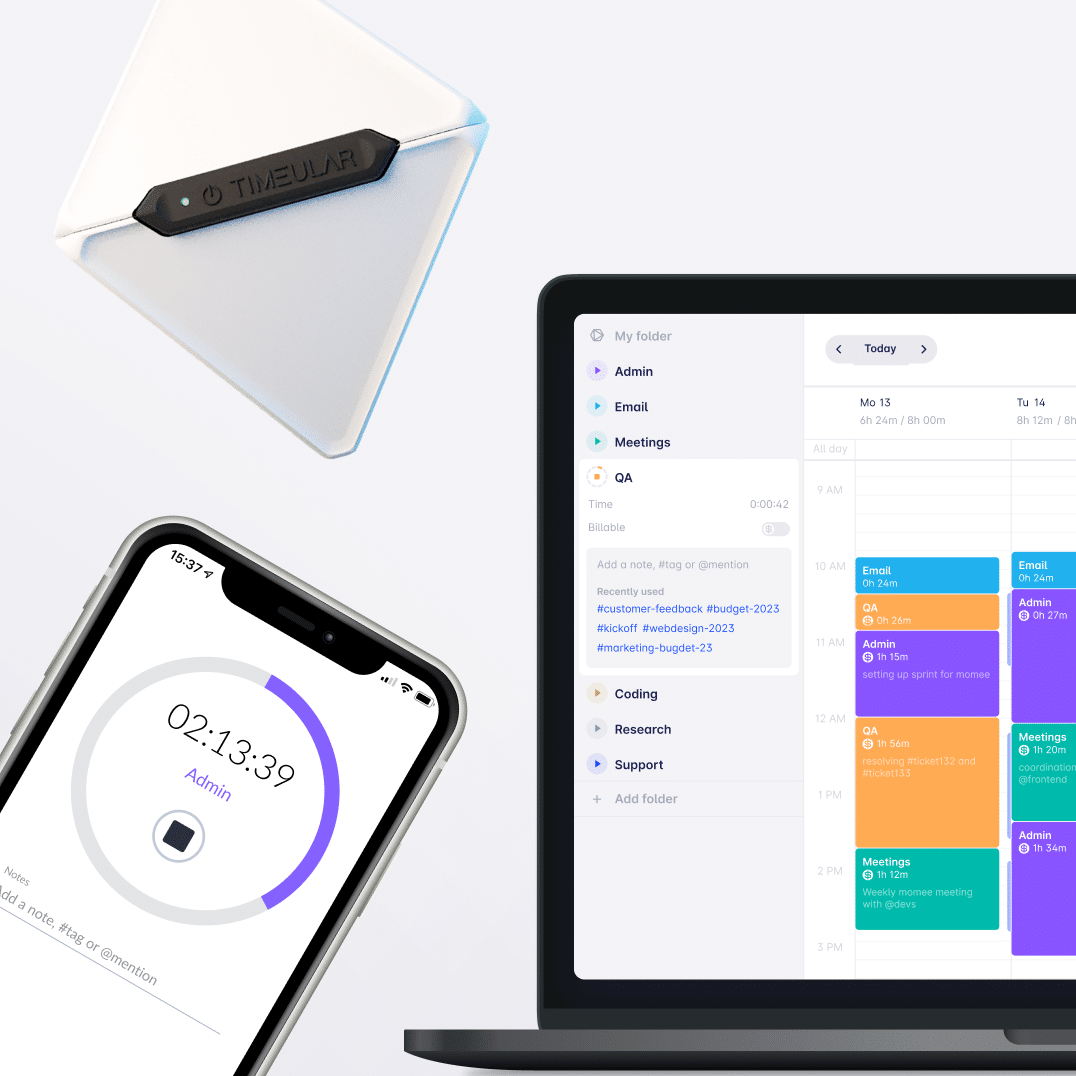How to Delegate Tasks Effectively [GUIDE]
Managing a team is a complex balancing act, and an essential skill in this process is delegation. In this article, we explore the art of effectively delegating tasks, a fundamental aspect of team leadership.
Discover how to delegate work in a way that not only lightens your load but also empowers your team.
We’ll provide practical advice on honing your delegation skills, ensuring you manage your responsibilities and team dynamics with confidence and efficiency.
Join us to get a straightforward answer to the question of how to delegate effectively.

Free eBook: How to work smart, not hard
Delegating tasks is one of the key methods to boost your productivity. Get your copy of the eBook and discover more tips on how to work smart, not hard
What is task delegation?
Delegating tasks means assigning work or any type of responsibility to other members of your team.
In the delegation process, you’re allowing yourself to focus on more critical work and projects while also developing the skills of your team members, allowing them to grow.
Why is delegating work important?
Delegating work is essential for several reasons, including:
- Increased productivity: By delegating, you can increase productivity by giving tasks to team members with the necessary skills and expertise to complete them efficiently.
- Better teamwork: Delegation allows you to promote teamwork as you’re encouraging your team to work together and share responsibilities.
- Less stress: When you delegate, you’re enabling yourself to focus on more essential tasks and projects and have less workload.
- Personal growth: You’re allowing your team members to develop their skills and expertise, as well as autonomy, by taking on new tasks and responsibilities.

Would you like to track the time spent on delegated tasks?
Try Timeular, the most effortless time tracking solution for your team!
Why do managers avoid delegating tasks?
Many managers hesitate to start delegating important tasks for a variety of reasons. A common concern is the desire to maintain control, as delegating often means placing trust in team members to handle significant responsibilities.
Some feel guilty about handing over tasks they perceive as burdensome, worrying about overloading their team. There’s also a fear that delegation might not align with being a good team leader, as it can be mistakenly seen as shirking responsibilities.
Additionally, managers who aspire to groom future managers might unintentionally hold back, thinking that keeping work to themselves is the best way to demonstrate competence and dedication.
This mindset can hinder the development of a more collaborative and empowered team dynamic.
How to delegate tasks effectively
Ready to tackle effective delegation? Let’s break it down. It all starts with a solid grasp of what your team members excel at and where they might need a bit more support. This insight is particularly crucial for new managers aiming to delegate effectively.
It’s about more than just assigning tasks; it’s about aligning them with your employees’ strengths, keeping the big picture in focus.
In the following steps, we’ll guide you through this process, helping you to ensure each staff member is playing to their strengths and contributing to the team’s overall success. Let’s get started!
1. Identify the tasks
When leading a team, the first step in effective delegation is to pinpoint the right tasks to hand off. This process becomes more streamlined with the aid of a workload management tool, which is crucial for both identifying time-consuming and tedious tasks and implementing top prioritization methods.
This strategy is not just about lightening your own load but about optimally utilizing the strengths within your team. Consider various aspects of project management or parts of important projects that could be better handled by others.
During performance reviews, use these insights to align delegated work with individual team member strengths. By carefully selecting the right tasks to delegate, you’re not only tackling tasks more efficiently but also enhancing the overall productivity and success of your team.

2. Choose the right team member
In team management, it’s essential to match the delegation of responsibilities with each team member’s work goals. When you’re ready to assign work, take a close look at each team member’s skills, knowledge, availability, and their individual goals.
This ensures that you’re not just delegating tasks but are also contributing to their professional growth. For example, a co-worker aspiring to develop new skills, i.e. management skills, could be the right person to supervise an intern or lead a project while you focus on higher-value activities.
It’s important, however, to consider their current workload and other commitments. Ensure they have sufficient time and resources to achieve the task effectively. For responsibilities requiring specialized skills, identify someone in your team who excels in similar technologies or has shown proficiency in related areas.
3. Define the desired outcome
When you delegate responsibility, it’s crucial to provide context, as well as set clear expectations and outcomes for the duties at hand. Merely transferring work to your co-workers doesn’t constitute effective delegation.
Instead, provide your staff members with a comprehensive understanding of the project, including how it ties into the organization’s broader goals. Discuss deadlines, expectations, and available resources to ensure they have a complete grasp of what’s required.
This should also involve outlining the metrics you will use to evaluate the success of their work. By being clear and hands-off only after ensuring understanding, you not only delegate work effectively but also prioritize high-priority tasks within your team.

4. Offer support
When delegating tasks, it’s crucial to support your team member, especially if they’re initially struggling. As a manager, it’s your responsibility to provide them with the necessary training, resources, or authority.
In time-constrained situations, you can involve other team members in the training process, which also offers them new challenges and learning opportunities.
Always be available to answer questions and provide constructive feedback, but avoid setting unrealistic goals that could lead to frustration and the task eventually returning to your workload. Additionally, steer clear of micromanaging.
Focus on guiding your team member towards the end goal and highlight the importance of the delegated work, rather than controlling every aspect of it. This approach not only fosters independence but also aids in their professional development.
5. Establish clear communication
When delegation occurs, it’s vital to balance avoiding micromanagement with establishing clear and effective communication channels. This ensures that the person you’re delegating tasks to feels comfortable asking questions and giving updates on their progress.
It’s common for someone new to a task or project to feel somewhat uncertain at the start. Regular check-ins and ongoing feedback are key components of effective project management. They help in guiding your team member through future tasks, especially as they develop new skills.
By offering support and guidance openly, you can help mitigate the failure impact that may arise if a task has to be reassigned or added back to your to-do list. Such communication helps in smoothly overcoming any challenges that may surface during the task execution.
- Did you know that clear communication is a key project management skill?
6. Leave room for failure
This step is especially crucial if you’re a perfectionist or tend to want complete control. Remember, your method isn’t the only way to get a job done. When delegating work, it’s important to allow room for failure.
This doesn’t mean you expect your employees to fail, but rather, you’re providing them an opportunity to experiment, evolve, and grow with new approaches.
Being open to various ideas and ways of handling tasks will make it easier for you to delegate when needed. This approach not only encourages innovation but also means you can offer constructive criticism in a way that’s helpful, enhancing their skills for other tasks.
7. Be patient
Delegating effectively involves patience, especially when it comes to certain tasks that you, as a manager with extensive experience, could complete quickly. It’s natural to think that specific tasks might be done faster if handled by only you.
However, when passing these responsibilities to someone else, remember that they may require more time to complete them. This difference in pace is often due to varying levels of experience and other factors, like familiarity with the task.
Resist the urge to take back some responsibilities just because you can do them quicker. Instead, consider the value of professional development for your team members. Reflect on your own early experiences in your career when you were learning and growing.
Over time, your employees will gain speed and efficiency as they become more acquainted with the job, leading to faster and more proficient task completion in the long run.
- Read our step-by-step guide to learn how to build a high-performing team.
8. Provide feedback and ask for feedback regularly
It’s important to maintain consistent feedback with your direct reports, particularly regarding tasks you’ve delegated. After a task is complete, assessing the outcome and giving relevant feedback is crucial.
If the task doesn’t meet expectations, providing constructive criticism is essential, as it guides your employees to improve and learn from their experiences, reducing the likelihood of similar issues in the future.
Equally important is acknowledging when tasks are completed successfully. Positive reinforcement not only boosts morale but is also one of the key ways to keep your team motivated, enhancing their confidence and productivity.
Furthermore, seeking feedback from your team is a crucial part of effective delegation. Check if they found your instructions clear and ask for suggestions on improving task assignments in the future.
This reciprocal feedback process is essential for continuously refining your delegation techniques and managing tasks more effectively.
9. Recognize and give credit
It’s essential to show genuine appreciation for the efforts and achievements of the person handling the delegated work. Acknowledging their hard work not only motivates them but also fosters an environment where high-level performance is recognized and valued.
This kind of recognition can inspire loyalty and contribute to the long-term success of your team. By consistently giving credit where it’s due, especially for work that often goes unnoticed as someone else’s job, you encourage a positive and collaborative atmosphere, making team members more inclined to assist with future projects.
Most common errors and when you shouldn’t delegate
Delegating is an essential skill for managers, offering mutual benefits when executed properly. Yet, even with trust in the process, it’s not immune to mistakes.
Here are some typical missteps managers often encounter when delegating tasks:
Not delegating enough
Some managers hesitate to delegate work, thinking they can do it better themselves. However, remember, there are multiple effective approaches.
Not delegating, especially for time-consuming tasks, can lead to burnout and missed development opportunities, hindering broader goal achievement. This reluctance to hand over responsibilities to someone else is a common mistake in delegation.
Micromanaging
Overseeing too closely, or micromanaging, is a frequent misstep in project management, often seen when managers delegate tasks. This approach can undermine the trust and confidence your team members have in you, leading to diminished overall performance and motivation.
It also hampers the flow of progress updates, as team members may feel overly scrutinized.
Not providing clear instructions
Neglecting to provide specific instructions can lead to significant issues in task delegation. It’s vital to clearly define the job description and expectations.
Without this clarity, the risk of confusion, mistakes, and missed deadlines increases, as team members may not have unlimited access to the required information or guidance for new ideas and approaches.
Not delegating to the right person
Delegating tasks to the wrong person on your team can be a recipe for disaster. Make sure you know your team well and are familiar with everyone’s strengths and weaknesses.
It’s important to assess each team member’s powers and limitations to delegate tasks accordingly.
Not providing adequate support
Delegating tasks without the necessary support can frustrate everyone involved. It’s vital to ensure that your team members have all the right resources, information, and guidance to complete their job successfully.
When managers shouldn’t delegate tasks
Delegating is generally good practice and brings many great benefits, but certain situations may not be appropriate:
- When the task requires specific expertise or knowledge that only the manager possesses.
- When the manager is entirely responsible for the outcome and cannot afford to take any risks during the process.
- When the task is highly confidential or sensitive and requires the utmost discretion.
- When no team members are available with the necessary skills to take on the task.
Conclusion
Understanding successful delegation and how to delegate tasks effectively puts you on track to enhance your team’s productivity.
While mastering delegation skills may initially seem daunting, it becomes simpler as you grow more confident in your team members and their ability to handle more responsibility.
Begin by assigning smaller tasks, gradually increasing their scope. Embrace the process of passing on duties; with practice, you’ll excel in delegation, boosting both success and productivity.
You might be interested in:


